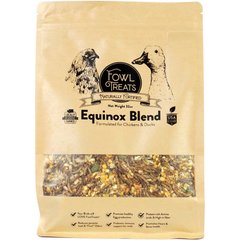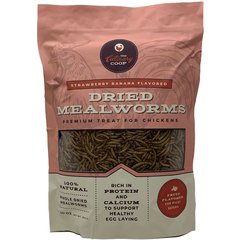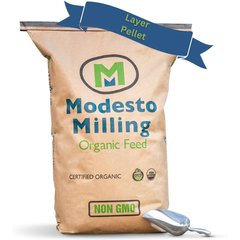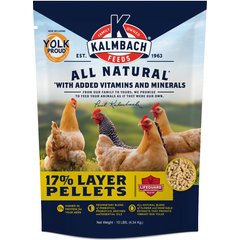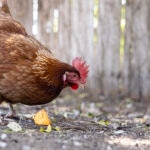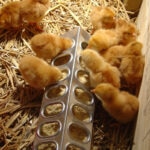Can Chickens Eat Bananas?
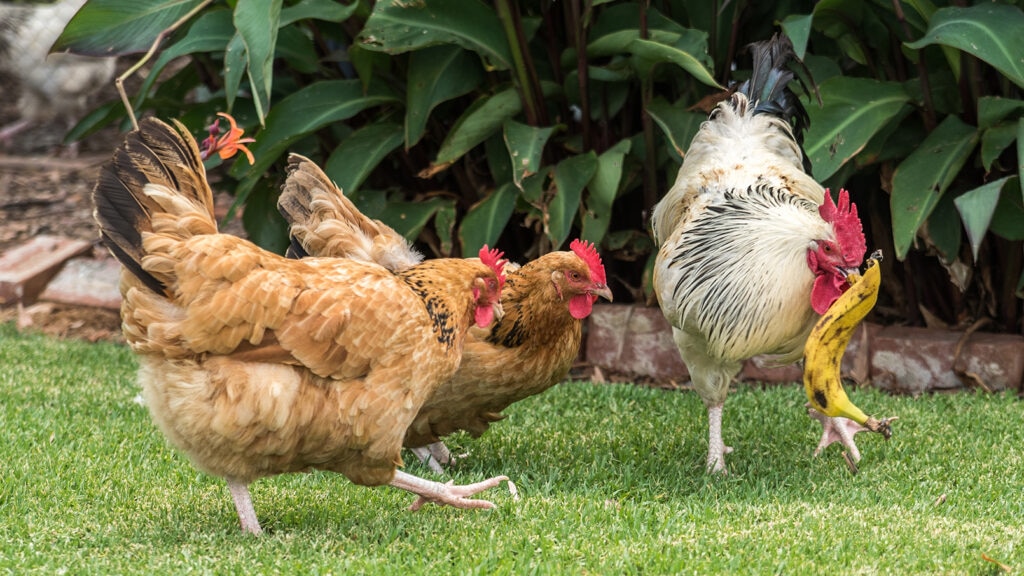
Photo by Candice O’Neill/iStock/Getty Images Plus
Chickens are natural foragers and love pecking at new and exciting foods—including bananas. But while bananas are a potassium-rich snack for people, can chickens eat bananas too?
We talked to two veterinarians to peel back the truth about bananas and how this tropical fruit can fit into a chicken’s diet.
Before introducing any new food into your chicken’s diet, always check with your veterinarian.
Can Chickens Have Bananas?
Yes! Bananas are a safe and nutritious treat for chickens, but because they’re high in sugar, they should be fed in moderation.
Recommended Products
Are Bananas Good for Chickens?
Because they contain some essential nutrients that can support overall health, bananas can be a healthy treat for chickens. According to Katrina Bocchine, DVM, associate veterinarian at Avian & Exotic Philly Vet Medical Surgical Clinic, in Philadelphia, Pennsylvania, bananas provide:
- Carbohydrates: Bananas are high in carbohydrates because of their natural sugars. This makes them a good source of energy.
- Fiber: Some of the carbohydrates in bananas come from fiber, which can help with digestion and gut health.
- Potassium: Bananas are especially rich in potassium, which is an essential nutrient for chickens that supports muscle and nerve function.
- Vitamin B6: Vitamin B6 plays a crucial role in a chicken’s metabolism by helping break down proteins, fats, and carbohydrates for energy. It also supports proper nerve function and brain health.
- Vitamin C: Vitamin C is naturally produced by chickens and helps strengthen their immune system, reduce stress, and support overall health. While they typically generate enough vitamin C on their own, bananas can provide a small boost, especially during times of heat stress, illness, or rapid growth.
- Magnesium: Magnesium is essential for maintaining strong bones and eggshell quality in chickens by aiding in calcium absorption and bone mineralization. It also plays a vital role in enzyme activation, which supports muscle function, nerve signaling, and energy production.
Are Bananas Bad for Chickens?
Bananas aren’t inherently bad for chickens. However, like any new food, they come with a few potential downsides that flock parents should be aware of. Here are a few risks to keep in mind:
- High sugar content: Ripe bananas are high in sugar, which can lead to issues such as obesity, digestive problems, and/or diabetes-like conditions for your feathery friend. Cathy Johnson-Delaney, DVM, board of directors chair at the Association of Exotic Mammal Veterinarians, also says that when chickens get a taste of the sweet stuff (which isn’t part of their normal diet), they might start to turn their beaks up at their regular food.
- Nutritional deficiencies: If your chicken starts refusing their regular food or you’re feeding them too many bananas in place of their feed, they might not get enough protein for egg production and overall health, according to Dr. Bocchine.
- Digestive upset: The fiber and sugar in bananas can cause digestive upset, which can lead to soft or runny droppings, mild diarrhea, and/or bloating. This is more likely if your chicken eats too many bananas.
- Choking hazard: The mushy consistency of bananas can be difficult for chickens to peck at, which can be messy at best and a potential choking hazard at worst. Make sure you’re cutting bananas into small pieces to minimize this risk.
If you stick to recommended serving sizes, these risks are less likely.
How Many Bananas Can I Give My Chicken?
So, how many bananas can you give a chicken? And can chickens have bananas every day?
A good chicken feed has all the nutrients your chicken needs, according to Dr. Johnson-Delaney, which means bananas should be only an occasional treat food. And all treats, including fruits, should make up no more than 10% of your chicken’s daily diet. The rest should come from a high-quality, balanced layer feed.
Recommended Products
Dr. Bocchine says a good rule of thumb is to give no more than a few small pieces of banana per chicken per day, roughly 1 or 2 tablespoons’ worth.
If feeding a whole flock, she says one banana split among several chickens is plenty.
Offering bananas once or twice a week rather than daily helps prevent issues such as obesity and digestive upset.
How To Safely Feed Bananas to Chickens
It’s important to be mindful of serving size, but you also want to take some extra steps to ensure you’re safely giving bananas to your chickens.
Dr. Bocchine recommends:
- Choosing fresh (not overripe or moldy) bananas: Soft, fresh bananas are best, as overly ripe bananas can cause digestive upset. Under-ripe bananas are OK too, because they’re lower in sugar than ripe bananas. Avoid banana chips and dried bananas with added sugar.
- Peeling the bananas: While peels aren’t toxic, they can be tough and difficult for your chicken to digest. If you do want to feed the peel, chop it into very small pieces.
- Cutting into small pieces: Slice the banana into bite-size chunks or mash it to make it easier for chickens to peck at and digest.
- Scattering them or using a feeder: You can scatter pieces on the ground for foraging fun or place them in a dish to keep the area clean.
My Chicken Ate Too Many Bananas—What Do I Do?
Despite your best efforts, your chicken might overindulge. If this happens, it can cause a handful of side effects, including:
- Diarrhea
- Bloating
- Crop discomfort or impaction
- Loss of appetite
- Hyperactivity
- Lethargy
If your chicken eats too many bananas and shows signs of diarrhea, sluggishness, or decreased appetite, you should schedule an appointment with an avian veterinarian for treatment and care.
What Other Fruits Can Chickens Eat?
Chickens can safely eat a variety of fruits, as long as you’re not overdoing it—remember, all fruits combined should make up no more than 10% of your chicken’s diet.
That said, Dr. Bocchine says the following fruits are safe in moderation:
- Apples (seeds removed)
- Berries (strawberries, blueberries, raspberries, blackberries)
- Mangoes
- Peaches
- Pears
- Pineapple
- Pumpkin
- Watermelon
FAQs About Bananas for Chickens
Q: Can baby chicks eat bananas?
A: It depends on their age. Dr. Bocchine says you shouldn’t give bananas to chicks under 8 weeks of age due to their underdeveloped GI systems and the fact that they require more protein in their diet for proper growth and development.
Q: Can chickens eat banana peels?
A: Yes, chickens can eat a very small amount of banana peels.
Dr. Bocchine says banana peels contain fiber and some nutrients, but they can be tougher than the fruit itself.
If you give your chicken banana peels, cut them into smaller pieces and make sure they’re clean and free of pesticides and chemicals. Organic bananas are a safer choice if you want to feed the peel to your chickens.
Q: Are dried bananas safe for chickens?
A: Dried bananas aren’t recommended for chickens.
Dried bananas have higher concentrations of sugar than fresh bananas do and are more likely to cause health issues and digestive upset, according to Dr. Bocchine.
Some commercially dried bananas may also contain added sugars, preservatives, or other ingredients that aren’t good for chickens.
Q: Can chickens eat overripe bananas?
A: Avoid giving chickens overripe bananas. They’re higher in sugar and can cause digestive upset. Dr. Johnson-Delaney says fruit flies, ants, and other insects are attracted to overripe bananas, and you don’t want them infesting a coop.
Attributions
This content was medically reviewed by Teresa Manucy, DVM, Chewy veterinarian.
